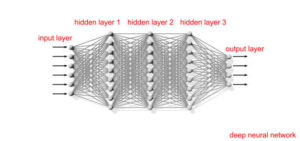Understanding the Fundamentals of Deep Learning
To become an expert in deep learning, we must first develop a rock-solid understanding of the foundational concepts. Deep learning is a subset of machine learning rooted in artificial neural networks with many layers. These architectures simulate the way the human brain works, allowing machines to learn from large volumes of data.
Key concepts to master include:
-
Artificial Neural Networks (ANNs)
-
Feedforward Neural Networks
-
Backpropagation and Gradient Descent
-
Activation Functions (ReLU, Sigmoid, Tanh)
-
Loss Functions (Cross-Entropy, MSE)
Without a complete grasp of these core principles, advancing in deep learning is impossible. Beginners must invest time in linear algebra, calculus, probability, and statistics, as these form the backbone of all deep learning algorithms.
Master Programming Languages and Tools for Deep Learning
One of the critical skills for deep learning proficiency is strong programming ability, especially in languages and tools tailored for data science and AI.
We recommend mastering:
-
Python – The most popular language for AI and deep learning.
-
TensorFlow – An open-source deep learning framework by Google.
-
PyTorch – Widely used in research, known for flexibility and ease of use.
-
Keras – High-level API running on top of TensorFlow.
-
NumPy, SciPy, Pandas, and Matplotlib – Essential for data manipulation and visualization.
Hands-on practice using these tools is necessary. Implement neural networks from scratch to understand how each component works internally.
Take Structured Deep Learning Courses
Structured learning provides a roadmap and prevents knowledge gaps. Several high-quality online courses can guide aspiring experts:
-
Deep Learning Specialization by Andrew Ng (Coursera)
-
CS231n: Convolutional Neural Networks for Visual Recognition (Stanford)
-
Fast.ai Practical Deep Learning for Coders
-
MIT 6.S191: Introduction to Deep Learning
These courses cover both theory and practical coding, which are essential to becoming a deep learning expert. Supplement these with relevant assignments and projects to reinforce learning.
Engage in Deep Learning Projects
Applying knowledge to real-world projects accelerates the learning curve. Start small and gradually increase complexity:
-
Image classification using CNNs
-
Natural Language Processing with RNNs and Transformers
-
Time-series forecasting with LSTMs
-
GANs for synthetic image generation
By working on diverse projects, we gain insights into data preprocessing, model architecture selection, hyperparameter tuning, evaluation metrics, and deployment strategies.
Public platforms like Kaggle offer excellent datasets and competitions to test and improve skills in a practical setting.
Understand Advanced Architectures and Techniques
To truly become a deep learning expert, one must go beyond the basics and explore advanced architectures and emerging techniques.
Key areas to explore:
-
Convolutional Neural Networks (CNNs) – Ideal for image and video data.
-
Recurrent Neural Networks (RNNs) and LSTMs – For sequential and time-series data.
-
Transformers and Attention Mechanisms – Powering NLP models like BERT and GPT.
-
Autoencoders – For unsupervised learning and dimensionality reduction.
-
Generative Adversarial Networks (GANs) – For generating realistic data.
Deep understanding of these architectures involves not just using them, but also knowing when and why to use a specific one depending on the problem domain.

Research Papers and Continuous Learning
Deep learning is a rapidly evolving field. Experts stay updated by regularly reading peer-reviewed research papers from conferences such as:
-
NeurIPS
-
ICML
-
CVPR
-
ACL
-
AAAI
Use platforms like arXiv, Google Scholar, and Papers With Code to follow the latest breakthroughs. Reproducing results from research papers sharpens both theoretical understanding and practical implementation skills.
Participate in AI Communities and Open Source Contributions
Engaging with the deep learning community is vital. Participate in:
-
GitHub – Contribute to popular deep learning projects.
-
Reddit (r/MachineLearning, r/DeepLearning)
-
Stack Overflow
-
LinkedIn Groups
-
Discord and Slack communities
By collaborating and discussing with other professionals, we expand our knowledge and learn new techniques. Open-source contributions build reputation and validate expertise in the field.
Build a Deep Learning Portfolio
To demonstrate expertise, it’s crucial to have a strong portfolio showcasing your work. Include:
-
Well-documented projects on GitHub
-
Technical blogs and tutorials
-
Model performance metrics and visualizations
-
Notebook walkthroughs on Jupyter or Google Colab
-
Video presentations of project outcomes
An impressive portfolio is a gateway to job opportunities, research roles, and consulting gigs in the AI industry.
Earn Certifications and Credentials
While not mandatory, certifications from reputable institutions enhance credibility:
-
TensorFlow Developer Certificate
-
Microsoft Certified: Azure AI Engineer
-
AWS Certified Machine Learning – Specialty
-
Google Cloud Professional Machine Learning Engineer
These credentials validate practical expertise and often align with industry standards.
Explore Deployment and Production Skills
True deep learning experts know how to take models into production. Learn skills such as:
-
Model deployment using Flask, FastAPI
-
Docker and Kubernetes for scalability
-
Cloud AI tools (AWS, GCP, Azure)
-
ML Ops and Continuous Integration/Deployment (CI/CD)
-
Monitoring and retraining models post-deployment
Knowing how to deliver AI solutions at scale differentiates an expert from an enthusiast.
Mentor and Teach Others
Teaching solidifies our understanding. By mentoring junior developers or creating educational content, we reinforce what we’ve learned. Opportunities include:
-
Writing Medium articles
-
Uploading YouTube tutorials
-
Speaking at meetups or conferences
-
Running workshops or bootcamps
Contributing to the growth of others helps build authority in the deep learning community.



